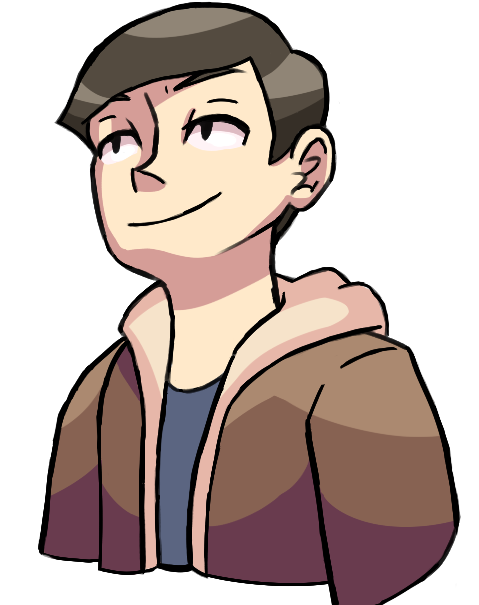RetroAchievements

RetroAchievements is a service integrated with supported emulators that adds achievements to retro games. Achievements are designed and coded by community members.
Below are achievement sets I have made or contributed to.
-
Developed Sets
Getting Started on RA
Earning achievements is as simple as making an account and connecting a supported emulator. This requires a constant internet connection, but most emulators will re-attempt unlocks while still running if there is a connection drop.

For each game you need to check the Supported Game Files, located on the right-hand
side
of
the page under the game's cover art. You need a clean dump of the game (if there are errors
in
the
dumping process or the game is modified afterwards, then it will not match the expected file
and
won't be detected), and it needs to be the correct region (USA vs Europe vs Japan...) and
revision
(rev0, rev1, ...)
Europe versions are preferred for handhelds because they usually offer more languages, while
USA
is
generally preferred for consoles for better performance. Japan is unlikely to be supported
unless it
is a japanese-only game, because adding support for multiple regions can be difficult and
there
aren't many japanese players on the site.
You can also find patches there, likely with a download link for a file to use with a patcher (RomPatcher works well for most formats) Some games require a patch or have QOL patches available, so its a good idea to check what is available. Translations are typically easy to support, so those should be available.
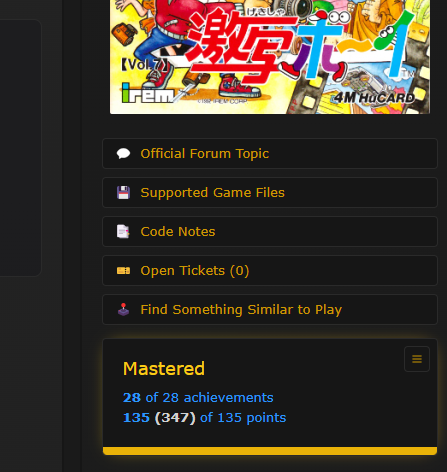

Collecting every achievement in a game will award you a mastery badge for your profile. Beating games will also be tracked, getting every achievement marked as progression and at least one achievement marked as win condition (if there are any) is considered beating the game.
There are two modes you can play in: Softcore and Hardcore. Softcore allows cheats (save states, rewind, ...), while Hardcore prevents these features from being used. Both are valid ways to play on RA depending on your preferences, but another rule of Hardcore is you shouldn't use save files that you have previously played on Softcore. There are separate points leaderboards for each setting and you get a yellow border on mastery badges and achievements earned on hardcore.
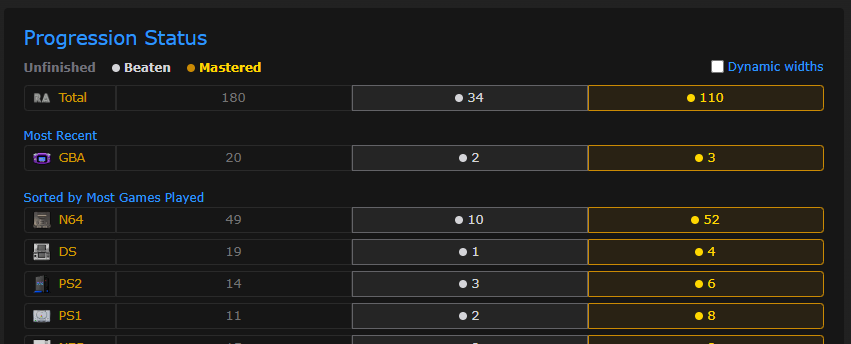
Achievement sets will expect you to be playing on a new save file, and should be coded not to award unlocks when loading a previously-used file. This prevents downloading a 100% save file online to use for easy unlocks, and its easier to track in-game unlocks on files that don't already have them.
There are also events such as Achievement of the Week where you're tasked with earning a specific achievement each week, and The Unwanted where each month a slate of games with low player counts are chosen for various tasks to earn tokens.
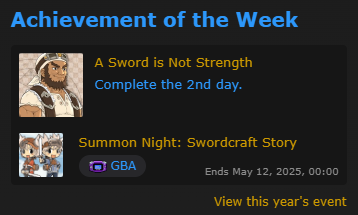
If a game you want achievements for doesn't have a set, you can use a set request so it gets more attention. The monthly digital magazine also has a section for community write-ins for wished sets.
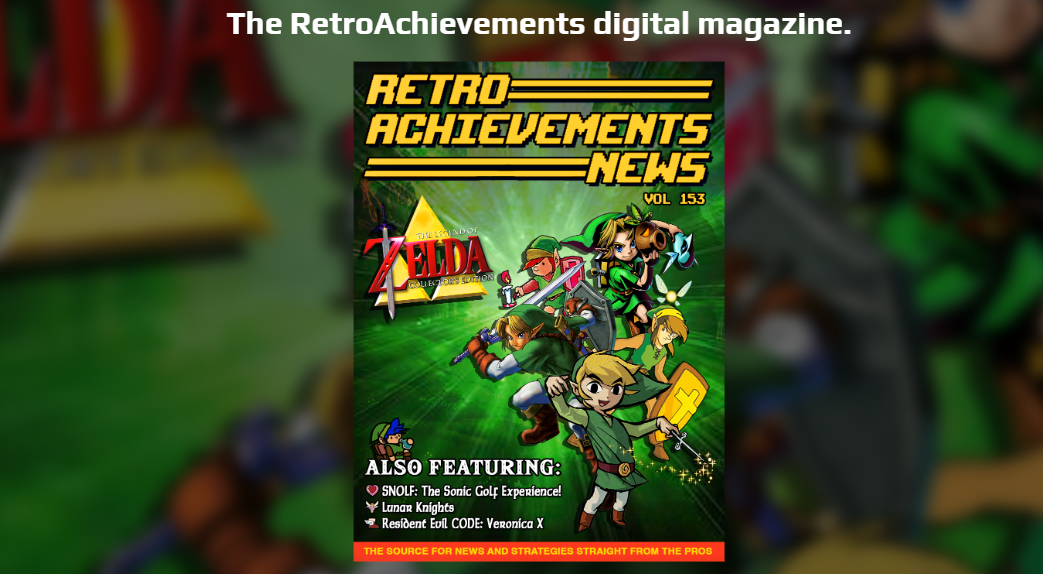
If an achievement doesn't unlock when it should (or unlocks when it shouldn't), then you should open a ticket. You can also submit a manual unlock request.
Developing Achievements
There are numerous tasks involved in developing a good (and compliant) achievement set: Designing the achievements, digging and documenting memory, writing and testing achievement logic, creating badge art, writing dynamic rich presence, and so on. The difficulty varies per game and per system.
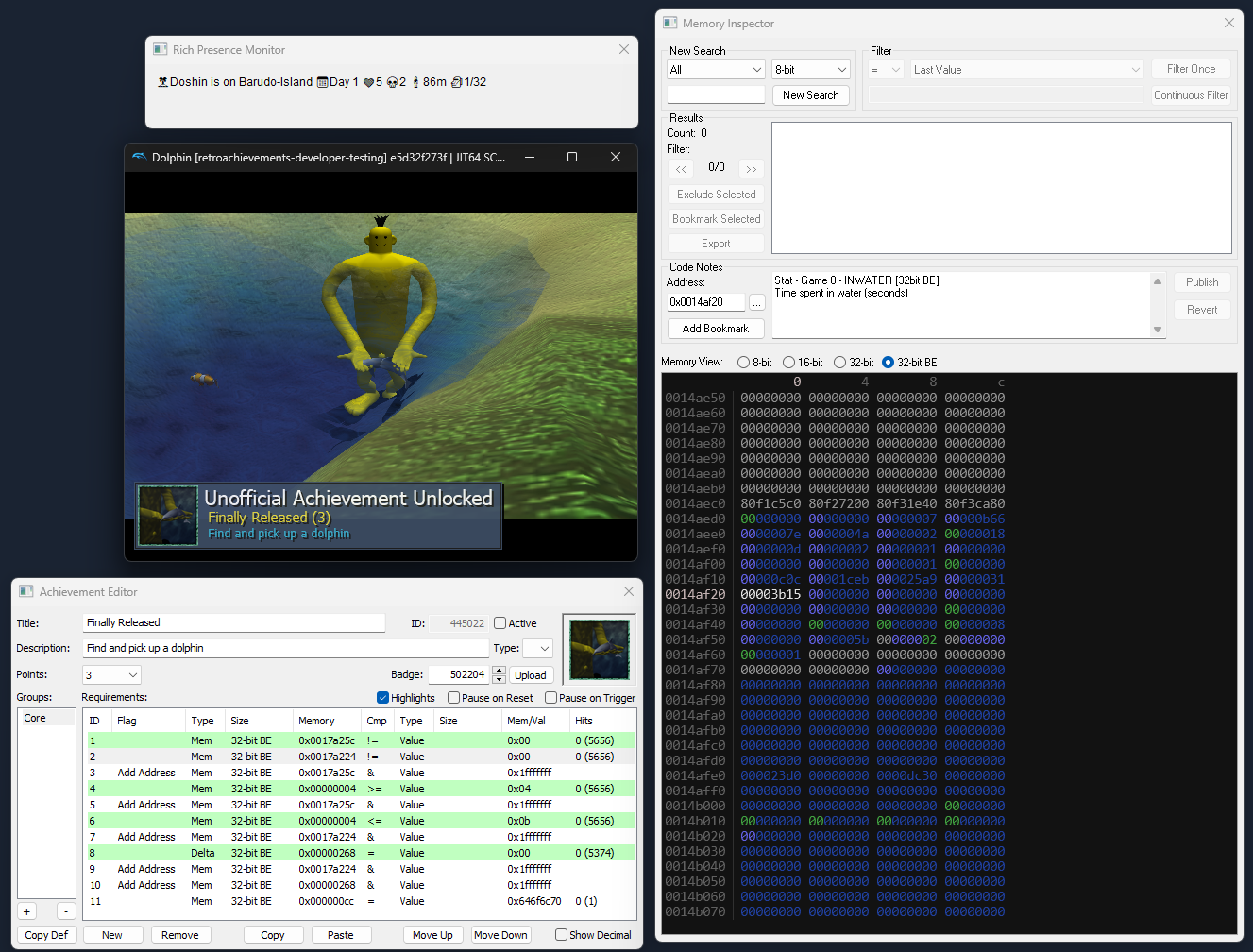
(This screenshot of mine was featured on Dolphin Emulator's Blog in the RA announcement post, my desktop background is the color of Manda's shirt)
Digging Memory
If you've ever seen a video on how to cheat in Flash games using CheatEngine, then you have a
good
idea of how this works. The game's memory (represented in hexadecimal) holds all the values
needed
for achievements - the player's position, current level, collected items, etc. The size of
these
values in memory will vary (larger numbers must be stored in a larger space), and sometimes
the
memory is dynamic meaning it will be located in different places at different
times.
The
more
values in memory that are found and properly utilized, the more concepts the achievements
can
explore - and the less issues. My ticket rate (amount of no or false unlocks players report)
is
relatively low, one reason being my grasp on dynamic memory and insistence on understanding
the
memory values that I use.
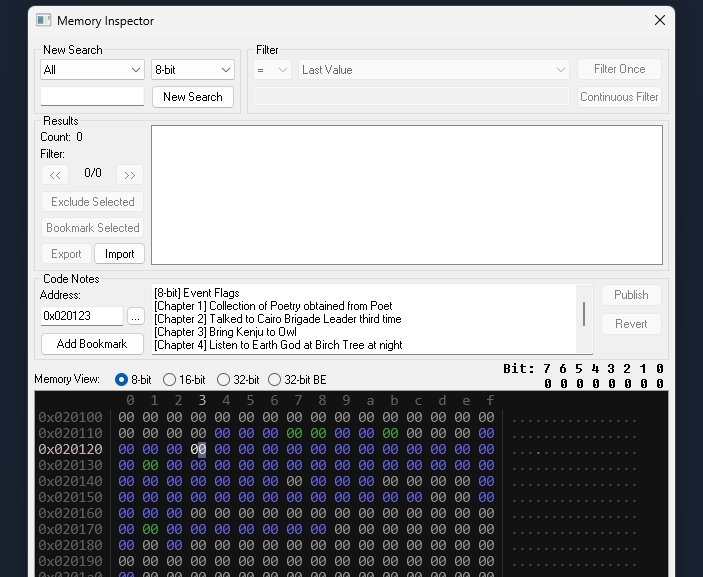
Achievement Logic
With these memory values you can set up conditional logic that will unlock the achievement when every condition becomes TRUE. A standard template for unlocking an achievement is to check the current game state and check that a value changes indicating you have unlocked something or reached a new level. The Delta type is used to check the value at an address on the previous frame.
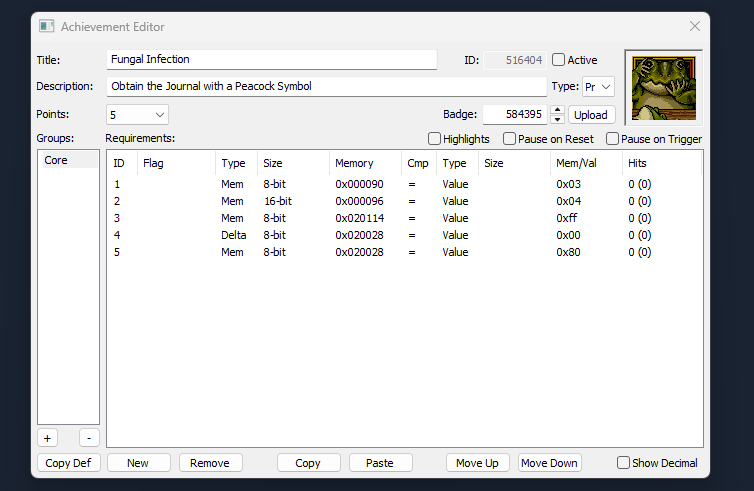
There are more advanced logic features, like for showing progress bars and for challenges that the game doesn't track (like damageless, no jumping)
Researching Games
I've worked on a few games that are obscure or notorious for misinformation. Games released in English are usually not too bad (though I have encountered some with little documentation), the games I usually need to research further are Japanese-only releases.
While english games primarily have GameFaqs as a resource for information, japanese-only games tend to be documented elsewhere. One site I've had luck with is jp.wazap.com, which is similar to GameFaqs' Cheats section. For more thorough guides I search the name of the game in japanese with something like "攻略", usually I will find a wiki or personal website with useful information.

As much as I like owning the strategy guides for the games I work on, they aren't as useful
as
I'd
hoped. Maps are convenient and have been nice to have, but if its not documented online then
the
guide usually won't have it either.
Tail of the Sun is a great example - the game has multiple endings and it was understood
that
the
character's stats can influence which ending you get, but there there were more endings with
completely unknown requirements. I purchased the guide hoping it would list the
requirements,
but it
doesn't. I ended up having to use a debugger to read the game's logic directly when it
decides
which
ending to activate. The map in this guide is also not accurate, making finding the game's
landmarks
more challenging.
Another example is Harvest Moon: A Wonderful Life. This game is notorious for misinformation
online.
There were 3 versions of the game across 2 systems, all with various differences. This
contributed
to confusion, but a lot of it is completely made up too. Another issue is the events in the
game,
the requirements for these events to occur is vague and difficult to determine exactly. None
of
the
guides I have looked at seem to get it right, and often are missing events entirely or list
clearly
wrong requirements.
I own more guides (some for games I haven't worked on yet), but they have similar issues or the information is accessible elsewhere already. These are more than a want than a need, but having a resource like this can make the devving experience more enjoyable. I stay away from expensive guides and don't expect them to hold all the answers.
Making Badges
For making game icons and achievement badges I use paint.NET, with this suite of plugins by BoltBait. There are some guidelines but basically they just need to be specific size and do not support transparency.
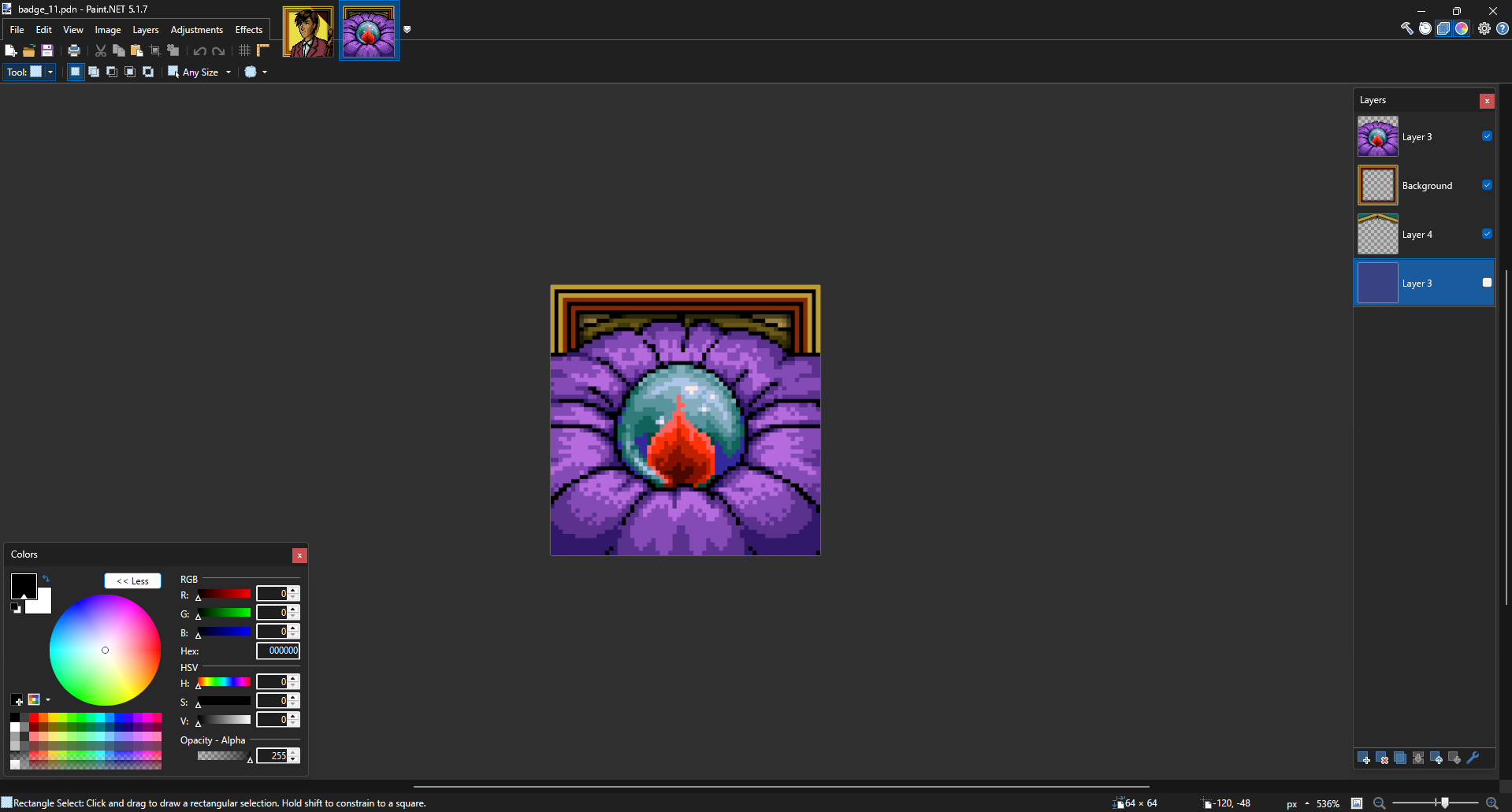
For game icons I look at the box art and other official art sources to find graphics that represent the game well. Some games are easier to work with than others in this regard. I usually like to have a border with a drop shadow, and have the character overlapping the top and/or sides. I also will sometimes blur the background to give a sense of depth or motion.


